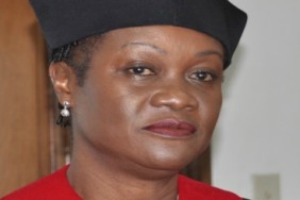EPA Director calls for global funding
-to tackle climate impact

The Head of Liberia’s Environmental Protection Agency is calling on the global community to provide greater financial support to help Liberia confront the escalating effects of climate change.
By Stephen G. Fellajuah
COP29 Summit, Azerbaijan, November 13, 2024—The Executive Director of the Environmental Protection Agency (EPA), Dr. Emmanuel Urey Yarkpawolo, has made a passionate appeal at the COP29 summit in Baku, Azerbaijan, urging the global community to provide greater financial support to help Liberia confront the escalating effects of climate change.
He emphasized that Liberia, like many vulnerable nations, is experiencing significant challenges due to rising sea levels, deforestation, and extreme weather events, which threaten its environment and people.
In his address, Dr. Yarkpawolo highlights the urgent need for funding to implement adaptation and mitigation strategies and enhance community resilience. He underscores that the country’s limited resources make it particularly difficult to tackle these challenges alone.
Liberia, with its rich biodiversity and coastal areas, stands at the frontline of climate change, making international assistance critical to its survival and sustainable development.
Dr. Yarkpawolo’s statement aligns with the broader calls from many developing nations at COP29, urging wealthy countries to honor their financial commitments to the Green Climate Fund and other climate finance mechanisms. These funds are essential for addressing the immediate impacts of climate change and helping countries like Liberia transition to low-carbon, climate-resilient economies.
Speaking with the BBC on Tuesday, November 12, 2024, Dr. Yarkpawolo reiterated the country’s urgent climate challenges and underscored the need for international funding to support Liberia’s ambitious national plan for climate resilience.
He details the pressing issues Liberia is confronting, including severe flooding, rising sea levels, and the loss of vital ecosystems, all of which threaten the environment and people’s livelihoods.
The EPA boss says that while Liberia has developed a comprehensive climate action plan, its lack of sufficient financial resources hampers its ability to address these challenges effectively.
He calls on global stakeholders to fulfill their climate finance commitments, noting that such funding is crucial for implementing adaptation measures, improving infrastructure, and safeguarding vulnerable communities from the worsening impacts of climate change.
In addition to the immediate need for financial support, Dr. Yarkpawolo explained the importance of global cooperation and urged the international community to recognize the disproportionate burden faced by countries like Liberia, which contribute minimally to global emissions but are among the most affected by climate change.
He notes that climate change has severely impacted Liberia, with some of the most noticeable effects being intense droughts, erratic rainfall patterns, and worsening coastal erosion.
According to him, these environmental changes have disrupted agriculture, the primary livelihood for many Liberians, and have led to food insecurity and increased poverty in affected regions. The erratic rainfall, in particular, has made it difficult for farmers to predict planting and harvest seasons, further compounding the challenges.
Coastal erosion is another major issue, threatening Liberia’s coastal communities, infrastructure, and biodiversity. Rising sea levels are eroding shorelines and displacing people while also threatening critical ecosystems, such as mangroves and coral reefs, which play a key role in maintaining the country’s biodiversity.
“Our government simply doesn’t have the funds,” Dr. Urey Yarkpawolo said, emphasizing that Liberia’s limited financial resources makes it difficult for the country to address pressing climate challenges adequately it faces.
He points out that despite the government’s efforts to implement climate resilience strategies, lack of funding has hindered progress. According to Dr. Yarkpawolo, this is why Liberia is making a strong case for increased international aid at COP29.
Reminding wealthier countries to turn their climate pledges into concrete actions, he wants commitments made at international forums like COP29 backed by real resources. “We are asking that commitments to climate action are not just goals on paper but are backed by resources that lead to real improvements in Liberia and other countries facing similar challenges.”
His message reflects a broader demand from developing nations for stronger financial support to address the devastating impacts of climate change. The EPA chief’s appeal also aligns with the principles of the United Nations Framework Convention on Climate Change (UNFCCC), which calls for global cooperation to combat climate change, especially emphasizing that developing countries that have historically contributed the most to greenhouse gas emissions should bear the greatest responsibility for addressing its effects.
The COP29 summit, which runs from November 11 to 22, 2024, serves as a platform for nations to assess their progress in meeting targets outlined in the Paris Agreement. This includes the overarching goal of limiting global temperature rise to “well below” 2°C and striving for efforts to keep it under 1.5°C.
Each country has committed to Nationally Determined Contributions (NDCs), outlining strategies to reduce emissions and build climate resilience. Dr. Yarkpawolo’s statement underscores the urgency of translating international commitments into tangible actions, particularly for countries like Liberia, which are on the front lines of climate impacts. Editing by Jonathan Browne



















